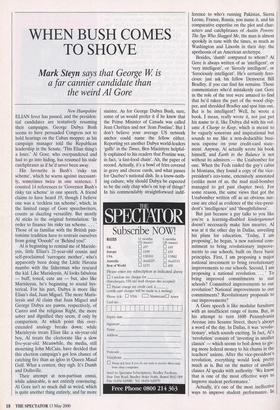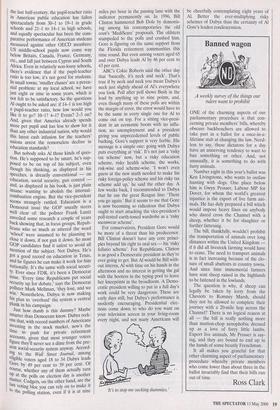WHEN BUSH COMES TO SHOVE
Mark Steyn says that George W is
a far cannier candidate than the weird Al Gore
New Hampshire ELIAN fever has passed, and the presiden- tial candidates are tentatively resuming their campaigns. George Dubya Bush seems to have persuaded Congress not to hold hearings on the Cuban moppet: as his campaign manager told the Republican leadership in the Senate, 'This Elian thing's a loser.' Al Gore, who overpandered and had to go into hiding, has resumed his stale catchphrases as if he'd never been away.
His favourite is Bush's 'risky tax scheme', which he warns against incessant- ly, sometimes twice in one sentence. I counted 14 references to 'Governor Bush's risky tax scheme' in one speech. A friend claims to have heard 19, though I believe one was a 'reckless tax scheme', which, in the limited range of Gore speechwriters, counts as dazzling versatility. But mostly Al sticks to the original formulation: 'In order to finance his risky tax scheme. . . . ' Those of us familiar with the British pan- tomime tradition have to restrain ourselves from going 'O000h!' or 'Behind you!'
Al is beginning to remind me of Marisle- ysis, little Elian's 21-year-old cousin and self-proclaimed 'surrogate mother', who's apparently been doing the Little Havana mambo with the fisherman who rescued the kid. Like Marisleysis, Al looks fabulous — buff, toned, cute ass — but, also like Marisleysis, he's beginning to sound hys- terical. For his part, Dubya is more like Elian's dad, Juan Miguel. The more Maris- leysis and Al claim that Juan Miguel and George Dubya are pawns, respectively, of Castro and the religious Right, the more sober and dignified they seem, if only by comparison. At which point this over- extended analogy breaks down: while Marisleysis treats Elian like a six-year-old boy, Al treats the electorate like a slow five-year-old. Meanwhile, the media, still mourning John McCain, have decided that this election campaign's got less chance of catching fire than an igloo in Queen Maud Gulf. What a contest, they sigh. It's Dumb and Dullsville.
Their attempt at non-partisan ennui, while admirable, is not entirely convincing. Al Gore isn't so much dull as weird, which is quite another thing entirely, and far more sinister. As for George Dubya Bush, sure, some of us would prefer it if he knew that the Prime Minister of Canada was called Jean Chretien and not 'Jean Poutine'. But I don't believe your average US network anchor could name the fellow either. Reporting yet another Dubya world-leaders `gaffe' in the Times, Ben Macintyre helpful- ly explained to his readers that Pontine was, in fact, 'a fast-food chain'. Ah, the paper of record. Actually, it's a bowl of fries covered in gravy and cheese curds, and what passes for Quebec's national dish. In a know-noth- ing culture, why should Dubya be expected to be the only chap who's on top of things? In his commendably straightforward indif- ference to who's running Pakistan, Sierra Leone, France, Russia, you name it, and his comparative expertise on the plot and char- acters and catchphrases of Austin Powers: The Spy Who Shagged Me, the man is almost spookily in tune with the times, as much as Washington and Lincoln in their day: the apotheosis of an American archetype.
Besides, 'dumb' compared to whom? Al Gore is always written of as 'intelligent', or `very intelligent', or 'fiercely intelligent', or `ferociously intelligent'. He's certainly fero- cious: just ask his fellow Democrat Bill Bradley, if you can find his remains. Those commentators who'd mistakenly cast Gore in the role of the tree were amazed to find that he'd taken the part of the wood chip- per, and shredded Bradley and spat him out. But is he intelligent? Well, he wrote a book. I mean, really wrote it, not just put his name to it, like Dubya did with his vol- ume A Charge to Keep, which is meant to be vaguely sonorous and inspirational but sounds to me like a non-deductible busi- ness expense on your credit-card state- ment. Anyway, Al actually wrote his book himself, and Earth in the Balance is not without its admirers — the Unabomber for one. When the Feds raided the guy's cabin in Montana, they found a copy of the vice- president's eco-tome, extensively annotated (unlike most of us, the mad mail-bomber managed to get past chapter two). For some reason, the same views that got the Unabomber written off as an obvious nut- case are cited as evidence of the vice-presi- dent's 'intelligence' and 'thoughtfulness'.
But just because a guy talks to you like you're a learning-disabled kindergartener doesn't necessarily make him smarter. Al was at it the other day in Dallas, unveiling his plans for education. 'Today, I am proposing', he began, 'a new national com- mitment to bring revolutionary improve- ments to our schools, built on three basic principles. First, I am proposing a major national investment to bring revolutionary improvements to our schools. Second, I am proposing a national revolution. . . . ' To bring improved commitments to our schools? Committed improvements to our revolution? National improvements to our commitments? Revolutionary proposals to our improvements?
A Gore speech is like modular furniture with an insufficient range of items. But, in his attempt to turn 1600 Pennsylvania Avenue into Sesame Street, there's always a word of the day. In Dallas, it was 'revolu- tionary', which sounds exciting. In fact, Al's `revolution' consists of 'investing in smaller classes' — which seems to boil down to giv- ing more federal money to his chums in the teachers' unions. After the vice-president's revolution, everything would look pretty much as is. But on the matter of smaller classes Al speaks with authority: 'We know that is one of the most effective ways to improve student performance.' Actually, it's one of the most ineffective ways to improve student performance. In the last half-century, the pupil-teacher ratio In American public education has fallen spectacularly from 30-1 to 19-1 in grade schools and 21-1 to 14-1 in high schools, and equally spectacular has been the com- parative performance of American students measured against other OECD members: US middle-school pupils now come way below Britain, Canada, France, Germany, etc., and fall just between Cyprus and South Africa. Even in relatively non-lousy schools, there's evidence that if the pupil-teacher ratio is too low, it's not good for students. In small towns, 'smaller classes' are a peren- nial problem: at my local school, we have just eight or nine in some years, which is not felt to be satisfactory. So the questions Al ought to be asked are: if 14-1 is too high a pupil-teacher ratio, how low would you like it to go? 10-1? 4-1? Evens? 2-3 on? And, given that America already spends more per pupil and has less to show for it than any other industrial nation, why would this latest cash infusion for the teachers' unions arrest the remorseless decline in education standards?
But nobody asks Al those kinds of ques- tion. He's supposed to be smart, he's sup- posed to be on top of his subject, even though his thinking, as displayed in his speeches, is drearily conventional — on education, social security, gun control and, as displayed in his book, is just plain Insane: wanting to abolish the internal- Combustion engine. But the vice-president seems strangely rattled. Education is a Democrat issue the GOP usually steers well clear of: the pollster Frank Luntz unveiled some research a couple of years back showing that, in focus groups, Repub- licans who so much as uttered the word school' were assumed to be planning to close it down, if not gun it. down. So most GOP candidates find it safest to avoid all mention of the subject. Not Dubya. He's got a good record on education in Texas, and he figures he can make it work for him nationally. It's the same with social securi- ty. Ever since FDR, it's been a Democrat Issue. 'Every time Republicans put social security up for debate,' says the Democrat Pollster Mark Mellman, 'they lose, and we w, tn.' Nonetheless, Dubya is now making his plan to 'overhaul' the system a central plank in his campaign. Just how dumb is this dummy? Maybe smarter than Democrats know. Dubya reck- ons that, with record numbers of Americans investing in the stock market, now's the time to push for private retirement accounts, given that most younger voters figure they'll never see a dime from the pre- sent social-security system anyway. Accord- tng the Wall Street Journal, among eligible voters aged 18 to 34 Dubya leads Gore by 49 per cent to 39 per cent. Of course, whether any of them actually turn 1113 at the polls on election day is another Matter. Codgers, on the other hand, are the last voting bloc you can rely on to make it to the polling station, even if it is at nine miles per hour in the passing lane with the indicator permanently on. In 1996, Bill Clinton hammered Bob Dole by demonis- ing among his contemporaries the old coot's `MediScare' proposals. The oldsters stampeded to the polls and crushed him. Gore is figuring on the same support from the Florida retirement communities this time round. But even among voters aged 65 and over Dubya leads Al by 46 per cent to 43 per cent. ABC's Cokie Roberts said the other day that 'basically, it's neck and neck'. That's true if by neck and neck you mean Dubya's neck just slightly ahead of Al's everywhere you look. Poll after poll shows Bush in the lead by anything up to nine points, and, even though many of these polls are within the margin of error, the error would have to be the same in every single one for Al to come out on top. For a sitting vice-presi- dent in an economic boom with no infla- tion, no unemployment and a president giving you unprecedented levels of public backing, Gore's support is very feeble. His message is a simple one: going with Dubya puts everything at 'risk'. It's not just a 'risky tax scheme' now, but a risky education scheme, risky health scheme, the works, risk-wise and scheme-wise. 'I won't even guess at the new math needed to make his risky foreign-policy scheme and his risky tax scheme add up,' he said the other day. A few weeks back, I recommended to Dubya that he use the great Reagan line: 'There you go again.' But it seems to me that Gore is now becoming so ridiculous that Dubya ought to start attacking the vice-president's poll-tested earth-toned wardrobe as a 'risky menswear scheme'.
For conservatives, President Gore would be more of a threat than his predecessor. Bill Clinton doesn't have any core princi- ples beyond his right to oral sex — his 'risky fellatio scheme'. For Republicans, Clinton is as good a Democratic president as they're ever going to get. But Al would be Bill with- out interns, Al with time on his hands in the afternoon and no interest in getting the gal with the hooters in the typing pool to leave her kneeprints in the broadloom. A Demo- cratic president willing to put in a full day's work could be very dangerous. These are early days still, but Dubya's performance is modestly encouraging. Presidential elec- tions come down to who do you want on your television screen in your living-room every night, and not many Americans will It's to stop me sucking dummies.' be cheerfully contemplating eight years of AI. Better the ever-multiplying risky schemes of Dubya than the certainty of Al Gore's leaden condescension.



























































 Previous page
Previous page